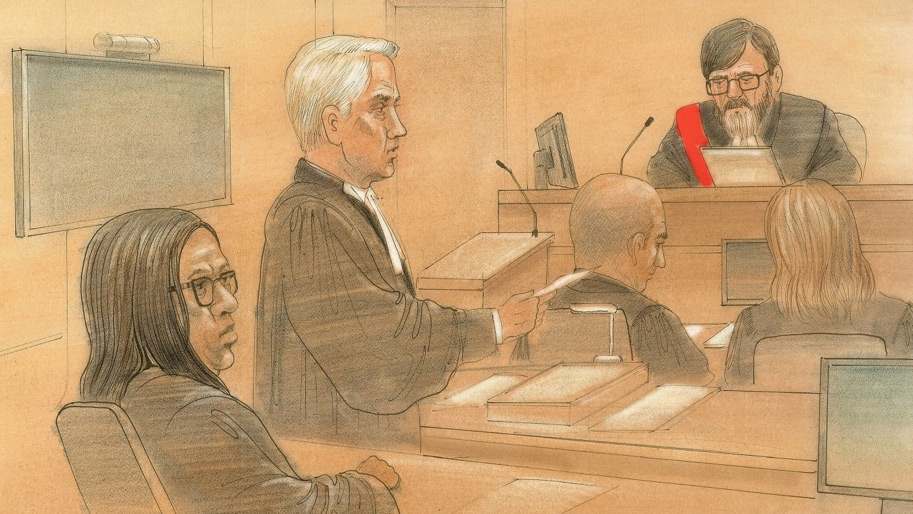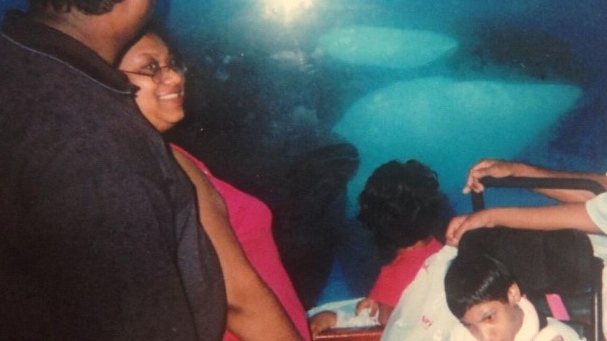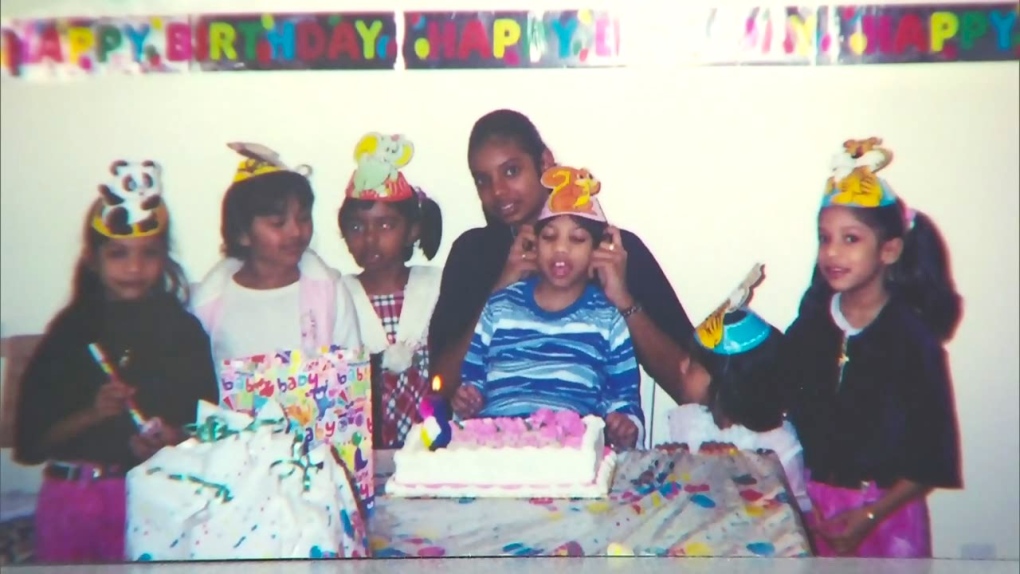Mother denies killing disabled teenage daughter in suggested act of mercy at Toronto retrial
Testifying at her Toronto retrial, Cindy Ali maintained that her disabled daughter, Cynara, died during a home intrusion in 2011, while the prosecution suggested she killed the girl in an act of mercy.
“I would never do that,” Cindy Ali told the court, fighting tears, when asked by assistant Crown attorney Craig Coughlan if she had hurt her daughter. “She was the joy of our family.”
- Download our app to get local alerts on your device
- Get the latest local updates right to your inbox
It’s the second time in seven years that Cindy has faced a charge of first-degree murder in the death of her daughter, Cynara, who lived with cerebral palsy and epilepsy.
Cynara died at The Hospital for Sick Children on Feb. 21, 2011. Two days earlier, Cindy called 911 claiming two men had broken into her Scarborough townhouse, located on Burrow Halls Boulevard, searching for a “package.” She told dispatchers that “her baby” was no longer breathing.
First responders found Cindy on the floor, seemingly uninjured, yet unresponsive, and Cynara on the couch without vital signs.
In March 2012, Toronto police charged Cindy with manslaughter, a charge upgraded to first-degree murder in the fall.
When the case went to trial five years later, the prosecution argued Cindy had smothered Cynara and staged her home to look like a break-in had occured. She did this, they alleged, because the burden of caring for Cynara had become too great.
In her 2016 testimony, Cindy maintained her account of the break-in and Cynara's death. She said that one of the intruders guided her through the home, searching for the package, and another stayed in the living room with Cynara. When Cindy returned to the living room, she said she saw her daughter lying lifeless on the couch and that one of the men was holding a pillow.
The two men then said they'd gotten the wrong house and proceeded to flee, she told the court.
The jury deliberated for 10 hours before convicting Cindy of first-degree murder and handing the mother of four an automatic life sentence, no parole for 25 years.
 Cindy Ali appears in a Toronto courthouse on Friday, Feb. 5, 2016. (John Mantha / CTV Toronto)
Cindy Ali appears in a Toronto courthouse on Friday, Feb. 5, 2016. (John Mantha / CTV Toronto)
Cindy was incarcerated for four years before defence lawyers James Lockyer and Jessica Zita, launched a successful appeal of her conviction, arguing that instructions given to the jurors were too narrow.
The first trial judge instructed the jurors that if they believed that Ali had made up the robbery story, they should infer that she had participated in her daughter’s death and should be found guilty of murder. Lockyer and Zita argued that this forced the jury into an all-or-nothing decision and failed to consider alternative scenarios.
In 2021, Cindy won the appeal. Her conviction and life sentence were overturned, and she was granted a retrial. Ongoing since mid-October, the trial is being presided over by Justice Jane Kelly alone.
READ MORE: What to know in the retrial of Toronto mother Cindy Ali as the defence kicks off
On Thursday, Cindy took the stand to testify in her own defence. She spoke about her daily life with Cynara, what was required in her care, and how much she loved the girl.
She retold her story of the alleged break-in, stopping to collect herself as she reached the point of the account in which said she was brought back into the living room to find Cynara lifeless on the couch.
“She was blue and her eyes were open,” Cindy said as she wiped tears from her face.
Raising a child with disabilities wasn’t always easy, Cindy admitted, but she said her family was never deterred from the task of caring for Cynara. The girl was not a burden on the family, she said.
“There were tough days but I loved it,” she said. “I just loved being with her.”
Allan also spoke of the family's devotion to Cynara in his two days on the stand.
“[Cynara] was never a burden, not for one day,” he said. “We took care of that child.”
Cindy and Allen met in Trinidad when they were children, Allan told the court. He and Cindy have been married for more than 30 years.
When they found out Cynara would be born disabled, the couple educated themselves on cerebral palsy, he said.
“Cindy and I wanted to give Cynara the best life she could have,” Allan said.
As she grew, Cynara developed into a “cheeky” and “happy” child. She loved Marineland, Allen explained, and they often took her to the Niagara Falls aquarium. She loved “The Price is Right,” anything Disney, and her favourite animals were frogs, according to his testimony.
 Allan, Cindy, and Cynara Ali can be seen at Marineland in a photo shown to the jury as an exhibit in Cindy Ali's 2016 trial. (Superior Court of Justice)
Allan, Cindy, and Cynara Ali can be seen at Marineland in a photo shown to the jury as an exhibit in Cindy Ali's 2016 trial. (Superior Court of Justice)
The couple never once had to hire a babysitter, Allan told the court – they had a close-knit network of family and friends from their church community. Cindy’s sister was often willing to provide childcare, she said.
In his testimony, Allan said Cindy not only cared for her own children, but often for the children of her fellow churchgoers, he said.
“When you walk around the church you always see somebody’s kids in Cindy’s arms,” he said.
When asked if Allan ever doubted Cindy’s account of Cynara’s death, the father gave a firm no.
“I have never thought Cindy smothered Cynara.”
 Cynara Ali with her sisters, celebrating a birthday in a Toronto Superior Court of Justice exhibit from Cindy Ali's 2016 trial.
Cynara Ali with her sisters, celebrating a birthday in a Toronto Superior Court of Justice exhibit from Cindy Ali's 2016 trial.
PROSECUTION SUGGESTS MOTIVE
In the cross-examination of Cindy, the prosecution narrowed down on changes in wording in the accounts she had given over the years.
For example, while testifying in the first trial, Cindy told the court she tried to escape one of the men by running out of Cynara’s bedroom and down the stairs. However, in her testimony on Thursday, she told the court she began running when already halfway down the stairs – a difference in detail the prosecution called “significant.”
In another line of questioning, Crown attorney Coughlan suggested Cindy had given four slightly differing accounts of whether one of the men had been holding a pillow at the time she entered the living room to find her daughter lifeless.
To these points, Cindy maintained that she had experienced a tragedy, that she was traumatized, and that she has always “done her best to remember everything.”
“I just know that when I came upstairs, [the man’s] back was to me, and when he left, he dropped the pillow. My daughter was on the couch and she wasn’t breathing. That was my focus,” she said.
The Crown also argued Cindy as the author of a letter the Ali family reported receiving in the months following Cynara's death. The letter, written in the voice of the alleged intruders, said the two men had carried out the break-in under the instruction of their "boss" but "got the wrong house."
Allan turned that letter into Toronto police's 42 Division, and each member of the Ali family submitted handwriting samples. To this day, its author and origins are unknown.
Cindy wrote the letter, argued Coughlan, to cover "perceived" holes in her story.
Friday’s cross-examination provided the court its first indication of what the Crown could argue as a motive, with prosecutors suggesting Cindy killed her daughter to limit her suffering.
The night before Cynara died, she had experienced a significant seizure. As an epileptic, this was not usual for the teen, but according to testimony, Cynara had not had a seizure for many months prior to that evening.
That seizure, the Crown argued, caused Cindy to become afraid for Cynara’s quality of life going forward.
Both the Crown and Cindy agreed that the teen would likely continue to suffer these seizures for years to come.
Coughlan then suggested that Cindy, having known that Cynara had already lived well past her life expectancy and would continue to suffer seizures, was hit with the realization that her daughter’s life would never get any better.
“I'm going to suggest that what you realized that night is that Cynara was going to keep going through similar events – that she had been given three years to live, that you kept her alive for 16, that you had done your very best for her throughout that time, and that you had tried to give her the best life she could have,” Coughlan said.
“I’m going to suggest you didn’t want that for her, and that on the morning of Feb. 19, once your family left, [...] that you went upstairs to the bedrooms and opened drawers, that you went to the basement and you opened drawers to make it look like someone had been there," he said.
“Once you’d done that, and the house looked like it had been rummaged through, you went to Cynara and you smothered her.”
Finally, Coughlan suggested Cindy never called 911 because of what had been done to her, but rather “what [she] had done to Cynara.”
Cindy denied each suggestion.
"I would have never thought of that. I cared for her for 16 years," she said.
The trial will resume at the Toronto Superior Court of Justice on Dec. 5.
CTVNews.ca Top Stories

opinion Tom Mulcair: Prime Minister Justin Trudeau's train wreck of a final act
In his latest column for CTVNews.ca, former NDP leader and political analyst Tom Mulcair puts a spotlight on the 'spectacular failure' of Prime Minister Justin Trudeau's final act on the political stage.
B.C. mayor gets calls from across Canada about 'crazy' plan to recruit doctors
A British Columbia community's "out-of-the-box" plan to ease its family doctor shortage by hiring physicians as city employees is sparking interest from across Canada, says Colwood Mayor Doug Kobayashi.
'There’s no support': Domestic abuse survivor shares difficulties leaving her relationship
An Edmonton woman who tried to flee an abusive relationship ended up back where she started in part due to a lack of shelter space.
opinion King Charles' Christmas: Who's in and who's out this year?
Christmas 2024 is set to be a Christmas like no other for the Royal Family, says royal commentator Afua Hagan. King Charles III has initiated the most important and significant transformation of royal Christmas celebrations in decades.
Baseball Hall of Famer Rickey Henderson dead at 65, reports say
Rickey Henderson, a Baseball Hall of Famer and Major League Baseball’s all-time stolen bases leader, is dead at 65, according to multiple reports.
Arizona third-grader saves choking friend
An Arizona third-grader is being recognized by his local fire department after saving a friend from choking.
Germans mourn the 5 killed and 200 injured in the apparent attack on a Christmas market
Germans on Saturday mourned the victims of an apparent attack in which authorities say a doctor drove into a busy outdoor Christmas market, killing five people, injuring 200 others and shaking the public’s sense of security at what would otherwise be a time of joy.
Blake Lively accuses 'It Ends With Us' director Justin Baldoni of harassment and smear campaign
Blake Lively has accused her 'It Ends With Us' director and co-star Justin Baldoni of sexual harassment on the set of the movie and a subsequent effort to “destroy' her reputation in a legal complaint.
Oysters distributed in B.C., Alberta, Ontario recalled for norovirus contamination
The Canadian Food Inspection Agency has issued a recall due to possible norovirus contamination of certain oysters distributed in British Columbia, Alberta and Ontario.


































